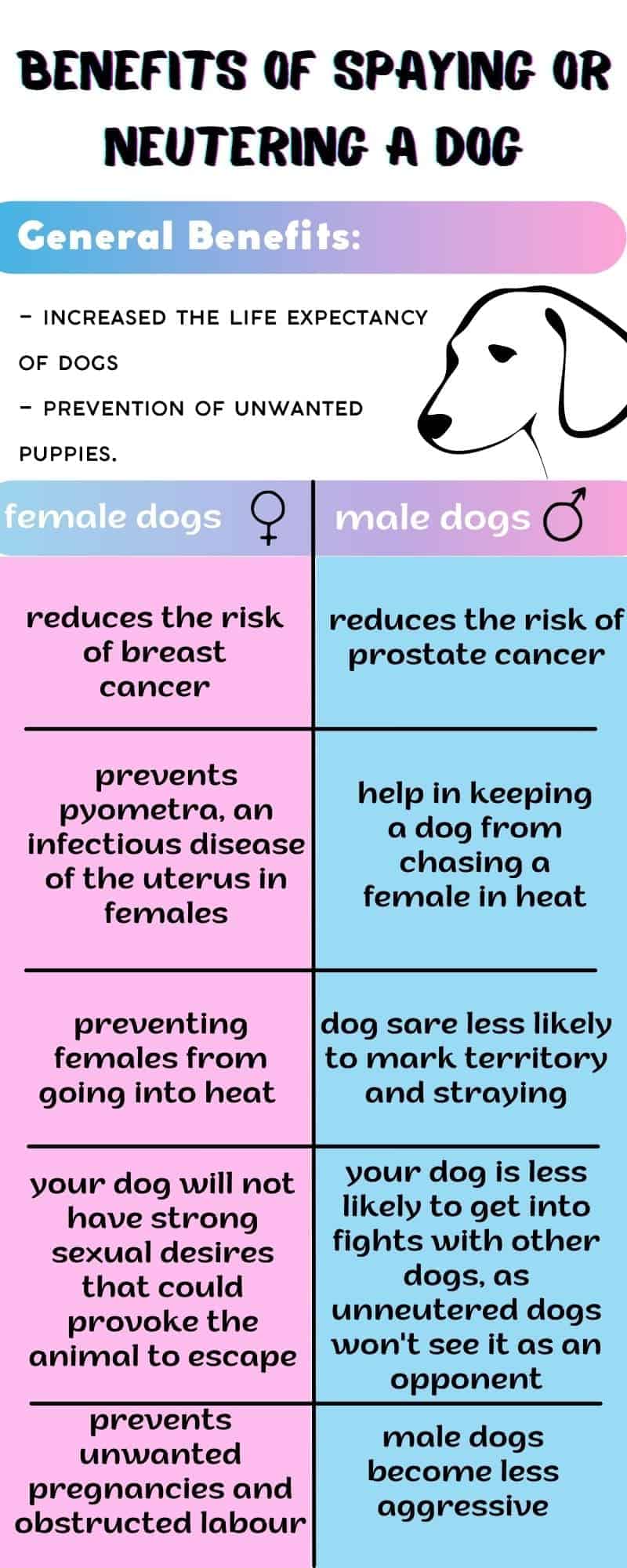As a dog owner, I am uncomfortable with the thought of unnecessarily subjecting my pet to surgery. So I did extensive research to find an answer to the important question: Should I neuter my dog (or spaying if you have a female dog)?
It turns out that it’s not that simple. For some dogs neutering is recommended, for others it can be dangerous. In this article, I explain in simple terms all the scientific facts I could get my hands on.
Contents
The health benefits of spaying/neutering a dog
In most cases, veterinarians recommend spaying (for female dogs) or neutering (for male dogs) because it has a positive effect on the health and behavior of dogs:
- it reduces the risk of prostate and breast cancer (I have not found exact data on this, so, there is no confirmation);
- Prevents pyometra, an infectious disease of the uterus in females. This disease develops in 1 out of 4 unspayed bitches. It requires urgent treatment and can be fatal;
- increases life expectancy of dogs, which was confirmed in the study (life expectancy increased by 26.3% in spayed bitches and 13.8% in neutered males).
After studying dozens of articles, I've noticed that they all try to exaggerate the benefits of sterilization and downplay the associated risks. I've not found any impressive evidence of the benefits of sterilization, aside from a single study on improving life expectancy... What do you think this is all about?
Other pros of spaying
As far as I know, the main reason all dogs are neutered is to control demographics. Every year about 390,000 dogs are euthanized in shelters (according to ASPCA). By neutering your dog, you’re helping to prevent unwanted puppies.
There’s also no denying that spaying/neutering makes life easier for dog owners. Below you’ll find a list of behavioral changes in dogs of different sexes after spaying. However, some of these changes don’t occur 100% of the time.
Benefits of spaying female dogs:
- it prevents bitches from going into heat, which usually happens twice a year and lasts about 3 weeks (the bitch then makes your house dirty);
- your dog won’t have a strong sexual desire that could cause the animal to run away;
- prevents unwanted pregnancies and obstructed labor (it’s not always possible to keep an eye on your dog, which can make her pregnant. And this is associated with additional costs and health risks).
Benefits of neutering male dogs:
- they mark their territory less often and stray less;
- male dogs become less aggressive;
- your dog gets into fights with other dogs less often, because unneutered dogs don’t see him as an opponent;
- helps keep a dog from chasing a bitch in heat (a male dog can sense a female in heat from up to a mile away and will become agitated).

Not for all dog owners there are enough reasons to decide for surgery. Especially because the changes in behavior are not always that significant. You also have to think about possible complications.
Negative consequences
All surgical procedures can have complications, including bleeding, loose stitches, inflammation, and complications from anesthesia. But statistics show that complications from spaying and neutering are rare (less than 1% of serious complications).
Also, removing certain sex organs in animals results in the removal of sex hormones. This can have some negative effects on the health of the dog.
What the studies say
A year ago, the results of a large study appeared that lasted 15 years and included data on 35 dog breeds. In the end, they came to the following conclusion:
- Susceptibility to sterilization-related diseases mostly depends on the breed or body size of the animal.
- There was no increased susceptibility to disease in small breeds weighing up to 20 pounds compared to non-sterilized dogs.
- But among larger dogs, there were individual breeds that were found to be more likely to get sick after spaying (both early and late) according to studies. For example, castrated male Golden Retrievers were 6 times more likely to have joint disease than intact ones, and females were 3 times more likely to have joint disease. Negative effects were also seen in Labradors and German Shepherds.

Other possible complications:
- reduces the lifespan of Rottweilers;
- causes obesity, and it occurs regardless of the age of the operation (this is confirmed by one study and a second study). The main cause of obesity is hypothyroidism (low thyroid level).
- Increases the risk of developing various cancers in both female and male dogs (according to A literature review on the welfare implications of gonadectomy of dogs);
- Urinary incontinence is 10-15% more common in spayed females.
As you can see, the situation is complicated and ambiguous. At first sight it looks like the surgery has a lot of disadvantages. These studies are mostly related to single breeds, so more research is needed.
So what to choose?
The above research results have forced veterinarians to reconsider their attitude towards sterilization, and they no longer recommend it 100%. But no one has the intention to abandon it, because this procedure has many advantages.
So it’s up to you to decide.
If you think that it would be too difficult to take care of an unspayed dog and you’re willing to take the risk, then agree to the surgery. However, there are some contraindications. Therefore, the situation should be discussed individually with your veterinarian, depending on the breed, health condition and age of the dog.
The vet will tell you exactly when it’s best to spay or neuter the dog, since the right age affects the further consequences of the surgery. The specialist will also tell you how to continue taking care of your spayed dog to prevent obesity and other negative consequences.
This advice is also given by the American Veterinary Medical Association.
Is it OK not to neuter your dog?
If you’re a conscientious dog owner, in control of your dog and ready to face any challenges, then you may not want to have the surgery. Many dog owners leave their animals intact and have no regrets.
You can also opt for the alternative method described below.
I suggest you watch this video before making your decision.
Alternatives to spaying and neutering
If you don’t want to spay or neuter your pet, consider alternative methods:
- Hysterectomy. This is an operation to remove the uterus and part of the fallopian tubes in female dogs. The ovaries remain, so behavior related to reproductive drive cannot be eliminated by the surgery.
- Vasectomy. In this surgery, the male dog’s vas deferens are removed. The testicles remain and produce hormones, so your dog will behave the same as if he wasn’t neutered.
- Non-surgical neutering of male dogs. This procedure is performed using medication that is injected into the dog’s testicles. This damages the individual cells of the testicle.
Discuss possible solutions with your veterinarian.
Conclusions
Spaying a dog makes life easier and can prolong your pet’s life. But this procedure can also have negative health consequences. So take your choice seriously.
If you’re willing to face all the aspects of living with an unspayed dog, that’s your decision. After all, who knows what’s best for your dog better than you? I believe that everyone has the right to decide for themselves and that you should respect the opinions of others.
Write us your opinion on this topic in the comments. And tell us about your experiences.
shoot.. wish i would have read this before i neutered my dog who i need to pick up in and hour. Our poor 7 year old Berniese. He is not going to be happy. Hopefully he will forgive us and we did not just cause him an earlier death. Just like the covid jab— do your homework before you do any medical proceedures. Do not just act on opinion but read and understand the data.